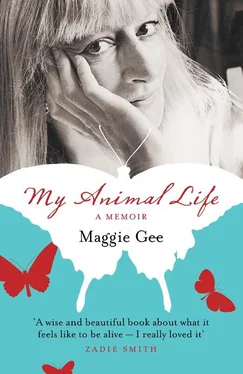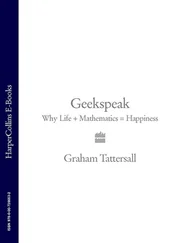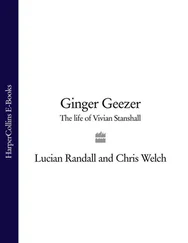Never tell someone else what they do or don’t need.
In the end, Mum got what she needed, by leaving, after all the three kids had gone out into the world, after Vic had retired and they had left the Billingshurst community where separation would have meant disgrace in the married middle class they had moved to.
It didn’t last. In my memory it was only weeks. My father was astonished, and despairing, because he adored, and depended on, Aileen. Because she was afraid, she left him without warning. Took the car, and fled to me, who by then was doing a PhD in Wolverhampton. I had to pretend, in answer to my father’s desperate phone calls, to know nothing. As I write this I still feel frightened, because Aunty Eve, who knew Vic didn’t like her, told us, in case we softened, ‘We think he’s got a car and he’s coming to find you.’ And so my mother and I set off on a panicky zigzag trip round unpleasant cheap hotels in Northamptonshire and Leicestershire. The logic behind this was never spelled out, though Mum’s niece Jeanette, her elder sister’s daughter, with whom she had lost touch, was fabled to keep a pub called ‘The Red Cow’ in Kirby Muxloe near Leicester, and in my researches since I have discovered that one side of Mum’s family, the Meakinses, had frequented Northamptonshire for generations. So maybe she was trying to go home, to shelter in the folds of a lost name. In any case, it didn’t work; we rushed around like moths trying to escape from a light that searched us out and drew us back. The terror of it was, ‘He’s coming after you.’
Traumatic. I was twenty-seven, but the idea of my parents splitting up was unthinkable, much though I wanted my mother to be free of fear, and have the life she wanted. She had talked about leaving for years, but only to me, and of course, loving her, I could not dissuade her. I wanted her to be happy because the pity I felt for her unhappiness was unbearable for me.
But how would they cope on their own ? Could there be a Mummy without a Daddy, a Daddy without a Mummy? Inside, at this critical moment, I was still six years old. I suspect that somewhere in every child whose parents split up is this helpless terror; the foundations of the world are shaken. The rigid shell that contained all the anger and fear in that marriage had broken, and now it was everywhere, glistening and quivering, terrible, revealed in the open. Every night Mum slept with a knife under her pillow, every day we drove somewhere with me sitting beside her, sedating myself by drinking British sherry from the bottle.
But the truth was very different from Eve’s report. My father was not angry, he was overwhelmed with grief. He had not tried to get a car to replace the one Mum had taken, and in any case had no idea where to find her, though later (perhaps in order to protect his love for me) he always pretended to think she’d spent the time away from him, not with me, as was the case, but with Eve and Albert, who of course he disliked already. When Aileen discovered that he only wanted her back, her resolve crumbled, and she became tearful. Her whole demeanour changed; now she felt she was doing wrong.
Within weeks she was negotiating to go back, or rather, in agony, I was. We all three met at another hotel, gloomy and English; a stiff meal at a small round table. There were obvious conditions, such as no more frightening behaviour and money of her own in a separate account; and there were touching ones, such as ‘us to have friends’, ‘us to have interests’. He agreed to everything, and improvising, I threw in one Mum had not had time to think of: ‘She wants to do a degree. She’s determined.’ ‘Your mother doesn’t need a degree.’ ‘Well she wants one, Dad.’ This time he conceded.
1977. And now their lives changed and expanded. Though my father had left his job two years earlier, this was the point when they started to live like the retired professional people with a good pension that they actually were. My mother registered to do a Humanities degree at the Open University. They marched round and knocked on the door of another couple their age, the Bishops, who also lived on Barratt Road: ‘We want to be friends.’ According to my mother, my father actually said those very words, unconsciously ticking off one of her conditions. Silver-haired John Bishop and his wife were just right, as friends; he was, I think, a retired tax officer, something not too different from a retired head teacher, and like Dad, he painted. They had the same size house, the same kind of car (Mum and Dad had by now pulled back from their belligerent, armour-plated Landrover into a pearly-green Golf, or rather a succession of Golfs, bought new, by my father’s rigid theory, changed every year), the same kind of mildly Germanic walking shoes and not-quite-country-coloured quilted rain-jackets. The same voices, within the same unthreatening range of accents, not posher than us, just right. And John Bishop painted and drew just well enough to be a worthy friend for Vic, but not too well, so as make him jealous.
Now they had friends. For the first time, they entertained.
(And here I must make a digression in order to explain what this meant. For throughout my childhood, the only people who came to the house in Billingshurst when my father was home were the following:-
Family. Rarely, because they nearly all lived north of us, and besides, there were eggshells they had to step lightly across. But the extended Gee family was, like my father, loyal.
Once, as a duty, the newly arrived head of Billingshurst Junior School, Mr Shaw, and his lean and racy wife Jackie (‘She’s like a yappy little dog,’ said my Mum, unused to female competition, and ‘He’s vain,’ said my Dad, having noticed, correctly, how my primary head teacher used his blue flashing eyes and surprised upright gingerish brows to command attention).
The woodwork teacher from my father’s school, Dougie Henderson, and his beautiful, soft-fleshed wife Margaret, who by their sheer physical dark-eyed charm and aura of perpetual laughter — were they Jewish or Italian, somewhere? More likely Scots, for Dad always had a soft spot for Scots — won my father over, made him feel safe (though both Mum and I were in love with the dark-jawed, dark-eyed, incredibly relaxed and soigné, slightly chubby Dougie Henderson; could men really be warm and tender and funny?)
Lastly, once a year, ‘the Louis’, Roger and Christiane Louis, always called ‘Monsieur and Madame Louis’ by us, the French teachers who came to Sussex with the French school with whom my father’s school did foreign exchanges. My mother put roses from the garden in the bedroom, but Monsieur Louis removed them with a charming apology, saying, ‘My wife says they are too smelly,’ which made my mother, in secret, laugh almost as much as the time Madame Louis, conversing at tea, referred to Margot Fonteyn: ‘she ees a very great Ballot-woman. I theenk,’ which might have been all right had my eyes not met my mother’s, whereupon she summoned me from the room ‘to help in the kitchen’, where we both collapsed, weeping and knocking our heads on the rose-pink Formica worktop in an attempt to muffle our laughter.
Oh, and the vicar, the Reverend Evan-Hopkins, once called for tea. The Rev Ev, as we called him, lacked the common touch. When told about the camping holiday we planned in Switzerland, the poor man said, in the fluting tones he could not help, ‘Everything on your backs, I think you’re marvellous.’ The Rev Ev was unfeasibly tall and weedy, his admiration for our peasant frames probably sincere, but it stung my father, after the vicar was gone, to cynical laughter. Thenceforth ‘Everything on your backs’ was Dad’s catchphrase for the vicar.
I make that seven people in total. Some of those once, twice at most. Many of the events marked by tension, social anxiety, and afterwards the ‘bloomin’ inquest’ in which my mother thought my father specialised. No wonder I began adult life as a social cripple, exhausted by gatherings of more than five people, terrified of parties, where, if I actually got through the door, I gabbled nonsense. Only in my last decade have I realised that I enjoy entertaining. Thus I follow the parental pattern, only slightly younger than Mum and Dad were when they first blossomed.
Читать дальше












